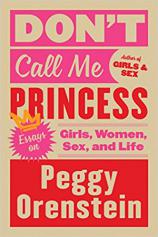Don't Call Me Princess: Essays on Girls, Women, Sex, and Life
Review
Don't Call Me Princess: Essays on Girls, Women, Sex, and Life
Bestselling feminist journalist Peggy Orenstein (GIRLS & SEX, CINDERELLA ATE MY DAUGHTER) opines that her writing career began when, as a senior in high school, she was asked to compose an article about teen pregnancy. Listening to her first interview subject, a teen mother from a lower class environment battling against society’s disdain and her own shame, Orenstein realized that “every woman’s life tells a story.” The offerings in her latest collection underscore that principle.
Orenstein begins with a look at some well-known feminists, from the very famous like Gloria Steinem and the woes and wonders of Ms. magazine, to lesser known figures like Phoebe Gloeckner, who creates wild, explicit cartoon stories of her alter-ego, Minnie. Elizabeth Blackburn is a successful biologist who recognizes that, for the most part and despite her own best efforts, science is still a male enclave.
"Both conversational and fact-laden, Orenstein’s prose surprises, informs and at times jars with its frankness."
Part Two moves to a realm far more personal (though all of Orenstein’s writings express her personal attitudes in subtle and not-so-subtle ways) as she recalls her experience of breast cancer. Illustrating how her thinking has changed over the years since she first struggled with the disease and all its concomitant issues, Orenstein writes now that she wonders if such widely touted procedures as early and yearly screenings are advisable or beneficial based on current statistics.
Looking at the agonies and ecstasies of motherhood and child rearing, Orenstein speaks with a couple who tried the stay-at-home dad strategy for a time. The dad in question, taking paternity leave, enjoyed the sweet intimacy of spending time with his infant daughter, but, not unlike his female counterparts, began to feel a sense of boredom and tedium at being housebound. Orenstein also examines the questions surrounding egg donor babies as compared to adopted ones, and the pros and cons of daycare, which, she wryly states, “is here to stay.”
In Part Four, Orenstein bemoans the “princess mentality” that has slowly arisen in the ashes of an earlier feminist longing for tough warrior girls and boys who liked to play with dolls. She is happy, though, when her own daughter, coming home from preschool with a beaded crown, decked out as Disney’s Ariel from The Little Mermaid, soothes her doubtful looks by declaring, “When I grow up, I’m still going to be a fireman.”
Both conversational and fact-laden, Orenstein’s prose surprises, informs and at times jars with its frankness. She does not shrink from even the thorniest of subjects, her closing essays entitled “When Did Porn Become Sex Ed?” and “How to Be a Man in the Age of Trump.” One laudable aspect of her writing is the secure sense that she won't flinch from re-examining her own stated positions, learning from the times as they change.
Reviewed by Barbara Bamberger Scott on March 2, 2018
Don't Call Me Princess: Essays on Girls, Women, Sex, and Life
- Publication Date: February 27, 2018
- Genres: Essays, Gender Studies, Nonfiction, Social Sciences, Women's Studies
- Paperback: 400 pages
- Publisher: Harper Paperbacks
- ISBN-10: 0062688901
- ISBN-13: 9780062688903




